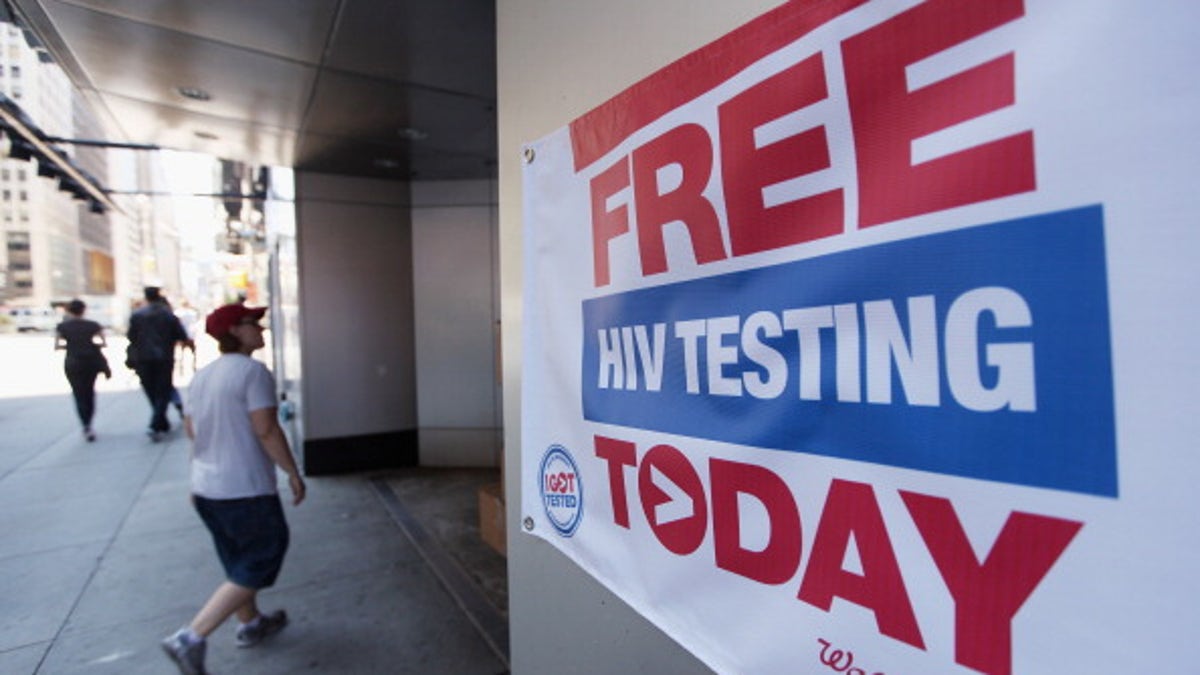
A sign for free HIV testing is seen outside a Walgreens pharmacy in Times Square in New York City. (Getty)
HIV testing could become as common as cholesterol check-ups.
New screening guidelines proposed by an independent panel insist Americans ages 15 to 64 should get an HIV test at least once—not just people considered at high risk for the virus.
The draft guidelines from the U.S. Preventive Services Task Force are the latest recommendations that aim to make HIV screening a routine part of a check-up, something a doctor can order with as little fuss as a cholesterol test or a mammogram. Since 2006, the Centers for Disease Control and Prevention (CDC) also pushed for widespread, routine HIV screening.
However, not everyone has been following up on the current recommendations. Of the more than 1.1 million Americans living with HIV, nearly 1 in 5—almost 240,000 people—don’t know it. Not only is their own health at risk without treatment, but they could also unknowingly be spreading the virus to others.
“It allows you to say, ‘This is a recommended test that we believe everybody should have,” said task force member Dr. Douglas Owens of Stanford University and the Veterans Affairs Palo Alto Health Care System. “We’re not singling you out in any way.”
If the updated guidelines are finalized, the task force could extend the number of people eligible for an HIV screening without a co-pay in their doctor’s office, as part of free preventive care under the Obama administration’s health care law. Under the task force’s previous guidelines, only people at increased risk for HIV—which includes gay and bisexual men and injecting drug users—were eligible for no co-pay screening.
There are a number of ways to get tested. If you're having blood drawn for other exams, the doctor can merely add HIV to the list, no extra pokes or swabs needed. Today's rapid tests can cost less than $20 and require just rubbing a swab over the gums, with results ready in as little as 20 minutes. Last summer, the government approved a do-it-yourself at-home version that's selling for about $40.
The new proposal also recommends the following:
—Testing people older and younger than 15-64 if they are at increased risk of HIV infection.
—People at very high risk for HIV infection should be tested at least annually.
—It's not clear how often to retest people at somewhat increased risk, but perhaps every three to five years.
—Women should be tested during each pregnancy, something the task force has long recommended.
The CDC recommends at least one routine test for everyone ages 13 to 64, starting two years younger than the task force recommended. A recent CDC survey also found that even though nearly three-fourths of gay and bisexual men with undiagnosed HIV have visited some sort of health provider in the previous year, 48 percent weren’t tested for HIV.
Based on reporting by the Associated Press.
Follow us on twitter.com/foxnewslatino
Like us at facebook.com/foxnewslatino
